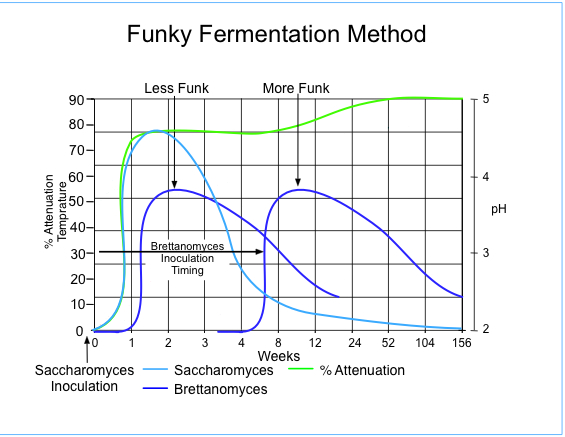Difference between revisions of "Brettanomyces and Saccharomyces Co-fermentation"
(→Brewing Methods) |
(Added Image) |
||
| Line 2: | Line 2: | ||
==Brewing Methods== | ==Brewing Methods== | ||
| − | [[File: | + | [[File:Funky_Ferm.jpg|thumb|upright=2.5|Conceptual graph of traditional microbe and wort dynamics|Conceptual graph of dynamics of funk expression and inoculation timing of Brettanomyces. Y-axis for each microbe group depicts relative activity which combines in a conceptual sense: growth, attenuation and production of flavor compounds. Plot drawn by Drew Wham based on concepts discussed in American Sour Beer <ref> Tonsmeire, M. (2014). American Sour Beers. Brewers Publications </ref> ]] |
[[Category:Techniques]] | [[Category:Techniques]] | ||
Revision as of 09:29, 29 July 2015
Funky mixed fermentations, for the purposes of this article, refer to fermentations that contain Saccharomyces and Brettanomyces. They do not contain lactic acid bacteria such as Lactobacillus and Pediococcus. As such, these beers may have a lightly tart flavor, but are not described as being sour (see the Mixed Fermentation page). The flavor of funky beers is often dominated by the array of flavor compounds produced by Brettanomyces (see Brettanomyces metabolism). Generically speaking, these flavors range from tropical fruits, stone fruits, smoke, barnyard animal funk, bitterness that lingers on the palate longer than hop bitterness and is accompanied by undertones of fruit, horse blanket, sweat, body odor, etc.
Brewing Methods

Conceptual graph of dynamics of funk expression and inoculation timing of Brettanomyces. Y-axis for each microbe group depicts relative activity which combines in a conceptual sense: growth, attenuation and production of flavor compounds. Plot drawn by Drew Wham based on concepts discussed in American Sour Beer [1]
- ↑ Tonsmeire, M. (2014). American Sour Beers. Brewers Publications